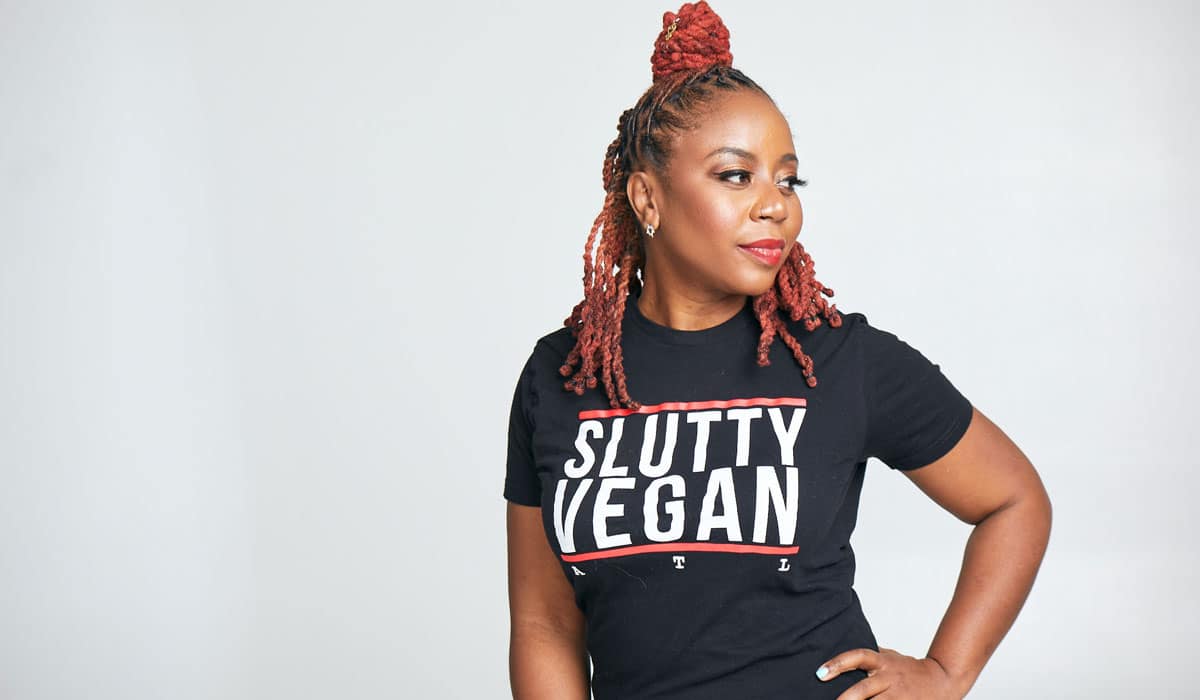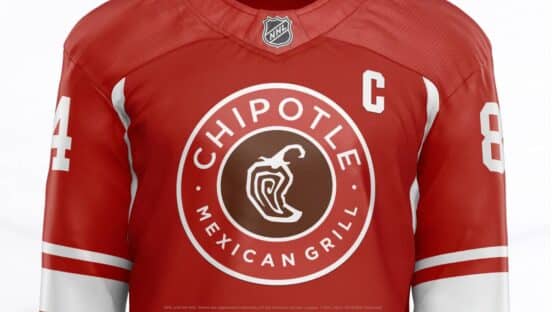Pinky Cole is all about creating opportunity. She’s created opportunity for herself on her path to founding plant-based fast casual Slutty Vegan, an Atlanta restaurant with plans to grow to at least 13 locations; Cole was a TV producer before she jumped into foodservice, originally with a restaurant called Pinky’s Jamaican and American Restaurant in Harlem. After she lost that restaurant in a fire, she saw opportunity in the emerging ghost-kitchen segment, and moved to Atlanta to open Slutty Vegan first as a ghost kitchen, then as a food truck, and later as a brick-and-mortar chain.
But Cole is also dedicated to creating opportunity for others—both those who are on her team and other women and Black entrepreneurs who have their own aspirations for business success. She’s almost singlehandedly built a plant-based-eating movement in Atlanta, one that employs dozens of people and has garnered national acclaim through celebrities’ social media posts. It’s a success story that she hopes can inspire other women and minorities, especially as the Black Lives Matter protests continue to shine a light on racial injustice and the myriad hurdles minorities face when launching their own businesses. In Cole’s words, she decided to become the change she wanted to see for the world—change that she’s optimistic is already taking root in the restaurant industry.
Cole joined QSR’s “Fast Forward” podcast to talk about how she launched Slutty Vegan, but she also discussed the Black Lives Matter movement and what the restaurant industry must do to reverse systemic racism. Below is an excerpt from the interview, condensed and edited for clarity. (Stream the whole conversation above or wherever you listen to podcasts.)
What is your message right now to your employees and your guests in helping to fuel this movement?
For us, the movement was already fueled. As a Black-owned business, there are certain hurdles that we had to go through that other businesses may not necessarily go through. I think that we are held to a certain standard, a standard that sometimes is unrealistic, and now is the time that that is going to change.
So there are two messages. The first message is for my people, and it is just, make sure that we are continuing to be in order, right? I’m out there to make sure that nobody has anything bad to say about my business. I make sure that the customer service is on point, that the quality is on point, that the energy is on point, and that I leave people with a great experience, so nobody can say anything about my business after that. I’m imploring all of the other Black-owned businesses to use this opportunity, because you’re getting the support right now. In the wake of everything that’s happening, people are trying to find ways to support. So let’s give them something to support.
And I want to be very clear. There are a lot of great Black owned businesses, and I hate the fact that there’s a stigma surrounding these businesses that we don’t do good work, because we do. And I’m just happy that people now get to see it. Let’s keep these customers, because there’s nothing better than a new customer than a returning customer. There are so many businesses right now that are doing well because they’re getting the support of so many people. And I want to make sure we continue to bring those people in the door so that they want to come back.
Secondly, I want to talk to the people who don’t have a Black-owned business, who are patrons of Black-owned businesses and who are not necessarily Black. We appreciate the support. We appreciate you coming to support Black-owned businesses. But we’re not a charity case. Don’t support us because you feel bad. Support it because you like the product. Support us because you think that it is a great concept. Black people are not charity cases, and I want to make that very clear. We’re just upset at the injustices that have been plaguing our communities for years. We’re not a charity, and once people get that into their heads, then I think that we can all come together in the name of food.
What needs to happen in the restaurant industry in order to overcome the racism that’s pervasive there?
I think the biggest thing is more companies, especially fast-food companies, need to have more people on the executive team that look like the communities they serve. Why am I going into a restaurant and supporting the company or brand when nobody looks like me? I’m working to make sure that we have more diversity in the workplace, because I want everybody to have somebody who looks like them, somebody who can identify with them so that they don’t feel like a minority in any space. Have the diversity in your workplace. Have more women in your workplace. Have people that look like the people that are coming to support your business.
In the wake of everything that’s going on, you hear a lot of “Black Lives Matter” [from companies]. Yeah, Black lives do matter. But show me the executive team. Show me who’s on your board. I’m not saying that your whole executive team has to be Black, but throw some diversity in there. Throw some different people in there so that you have people who have different experiences about the world that can come together and offer a different point of view and narrative to how you grow your company. That is how it should be. That’s one of the biggest things.
We’ve got a lot of work to do. But as it relates to the restaurant industry, there are a lot of great Black-owned businesses in the world. More people are supporting Black-owned businesses and Black-owned businesses, keep up the great work, because now the world is going to see who we are. Be excited about it, and we’ll have more companies that will be able to scale.
I’m not doing this for me. I’m doing it for people who look like me. I’m doing it for dreamers, for people who wanted to have a restaurant. I come from East Baltimore; my parents were Jamaican, they were immigrants. I didn’t come from much. I came from humble beginnings. I’m using this opportunity to show people and be the example that you can come out of your circumstances and you can be the best that you can be. And you can be all the things that you ever dreamed of in your life.
Opportunity does not exist for minorities, for people of color, for women, like it does for men and for the white population. What is your message to other young entrepreneurs who are Black, who are minorities, who are women?
The first thing is the sky is not the limit. You could be anything that you want to be. You can break down barriers. You could break the ceiling. That’s what we’re here for. If you’re a woman or minority, break that ceiling, break those barriers, break those walls down. You’re going to get a lot of “no’s.” I get “no’s” all the time. But I own every room that I walk into because I’m confident about my femininity. I know that I have so much to offer the world. And as long as you have that mindset, you could be anything that you want to be. You could be the CEO of the biggest company in the world. You can start your own company, and you could sell your company for billions. That’s my mindset. And as long as you have a “I can and I will do” mindset, you can do and be anything that you want to be.
What do you think these major foodservice corporations need to be doing beyond just posting a message saying that Black Lives Matter, beyond more minorities in executive roles?
It’s not enough, just a post that says Black Lives Matter. I think that there are companies that are using this as a marketing tool because they understand that their business is at stake right now. Because you have to choose a side; you are racist or you’re not. There is no gray area. It’s one or the other. Businesses are being forced into a place where you’ve got to make a choice. You really have to tell the truth of who you are, and what that means is a lot of companies are being revealed. There is a social responsibility that’s happening within companies. But when you’re silent, you’re also sending a strong message. So while I appreciate businesses speaking up about the Black Lives Matter movement and George Floyd and all the injustices against the Black people that have been murdered at the hands of police brutality, it’s not enough to just write a post, because three months from now that could fizzle.
One thing that I’ve done as a Black-owned business is I went ahead and I opened up a Black bank account. I moved my money over to a Black bank account because I wanted to be able to support another Black-owned company with my money so that they can pour those dollars into the Black communities. Companies should take a page out of that book and do that. Nobody’s saying to move all your money, but maybe open up a Black bank account and put in money there. I think that would make a big statement.
Include more minorities on the executive boards and continue to empower and position minorities, especially Black people, in these higher places. Black people are intelligent. We’re brilliant, we’re masterminds, we’re magic—just as capable, if not more, than some of our counterparts. We just don’t necessarily get the same opportunities, and that’s a fact. I love the donation piece. I love that they’re donating to organizations. But what are you paying your minorities in the company? Are they getting paid less than the people who are not minorities? It’s something to think about.
Before this, this was Black people fighting against the injustice. Now it feels like everybody is coming together, finally, to fight against the injustices of Black people and police brutality. And that’s something that we’ve never seen before. And something that we’ve never seen before is companies are not just having to be transactional and sell a product. You really have to have a social responsibility, because in the wave of digital and social media, you have to have a voice as a company. They want to see you. And if you don’t stand for something, your business is going to fall apart.
Technically restaurants are the most diverse in the country, but to your point, that’s at the store level, not the executive ranks. Are you optimistic that this changes, starting now?
Absolutely. It’s unfortunate that it took George Floyd to be murdered for this to happen. This was like the final straw. It’s terrible and it’s sad and it’s disgusting. I wish it never happened. But his death changed the world, and I believe that his legacy is being able to change how we think about each other and how we communicate with each other, how we cohabitate with each other, how we work together, no matter the color of your skin. And I think that the change is going to happen. It’s going to take people going to the polls to vote. It is going to take people making their voices heard; it’s going to take more CEOs of companies to get more involved in communities, Black communities. It’s going to take more of that for that change to take place. But I’m optimistic about it. I feel good about it.
I’m going to be that change that I wish to see. I’m going to be the CEO of a company that has diversity in the workplace, that’s empowering young Black people to have growth opportunities. I’m going to be that change, so other businesses can look at me as the CEO of the company and say, “You know what? I want us to model our company like Slutty Vegan because that is a workplace that’s inclusive of everybody. You’ve got somebody from all walks of life.” We’re empowering people to be leaders in the workplace and raising and teaching them up so that they can be the best that they can be. And as long other businesses had that same mindset, I think that we can win, especially as it relates to quick-service restaurants.











